Cite this document
(“Amnesia Essay Example | Topics and Well Written Essays - 2000 words”, n.d.)
Retrieved from https://studentshare.org/miscellaneous/1513596-amnesia
Retrieved from https://studentshare.org/miscellaneous/1513596-amnesia
(Amnesia Essay Example | Topics and Well Written Essays - 2000 Words)
https://studentshare.org/miscellaneous/1513596-amnesia.
https://studentshare.org/miscellaneous/1513596-amnesia.
“Amnesia Essay Example | Topics and Well Written Essays - 2000 Words”, n.d. https://studentshare.org/miscellaneous/1513596-amnesia.


